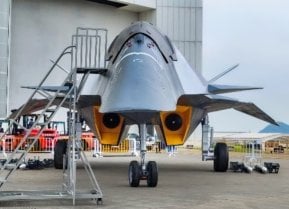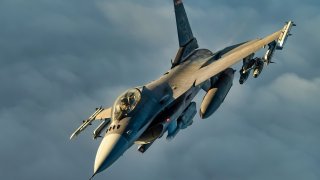Turkey Is Reducing F-16 Fighter Jet Buy
After a prolonged negotiation, earlier this year the U.S. green-lit a deal with NATO ally Turkey (Türkiye) for 40 new F-16 Fighting Falcon multirole fighters and 79 modernization kits for Ankara's fleet of existing F-16s. However, this week, Turkey has reversed course – and has announced it will scrap the purchase of the kits.
After a prolonged negotiation, earlier this year the U.S. green-lit a deal with NATO ally Turkey (Türkiye) for 40 new F-16 Fighting Falcon multirole fighters and 79 modernization kits for Ankara's fleet of existing F-16s. However, this week, Turkey has reversed course – and has announced it will scrap the purchase of the kits.
"An initial payment has been made for the procurement of F-16 Block-70," Turkish Defense Minister Yasar Guler said on Tuesday, adding, "A payment of $1.4 billion has been made. With this, we will buy 40 F-16 Block-70 Viper and we were going to buy 79 modernisation kits."
Ankara had first expressed interest in increasing its F-16 fleet in October 2021; more than two years after Washington expelled its European ally from the fifth-generation F-35 Lightning II fighter program for its acquisition of the Russian-made S-400 "Triumf" air-defense system. The United States had finally agreed to conclude the deal after Turkey approved Sweden's bid to join NATO earlier this year.
There has been speculation for months that Turkey might scale back its purchase of the new kits, and in July Bloomberg first reported that Ankara was considering directing the money towards its domestic aviation industry. Turkey will take on the modernization of the aircraft.
"We gave up on this 79. This is why we gave up: Our Turkish Aerospace Industries (TUSAS) facilities are capable of carrying out this modernisation on their own, so we deferred to them," Guler added.
New Aircraft Still on the Table
Though Turkey won't require Lockheed Martin's modernization kits, it will still move forward with the acquisition of the 40 new F-16s from the aerospace firm as part of a $7 billion deal.
The United States Air Force is no longer acquiring the Fighting Falcon, but Lockheed Martin continues to produce it for foreign customers including NATO members Bulgaria, Poland, and Slovakia, while Bahrain, Morocco, and Taiwan are also set to receive new F-16s in the coming years.
The F-16 Fighting Falcon remains the most widely adopted fixed-wing aircraft in military service today, with the aircraft now operated by more than two nations around the world. Turkey remains among the largest operators of the F-16 with more than 200 models from Blocks 30, 40, and 50.
Turkey Seeks a Modern Air Force
Ankara has sought to retire its aging fleet of F-4 fighters, and the F-16s have been seen largely as a stopgap measure as Turkey continues the development of its domestically-built TAI KAAN (TF) fighter. Last year, Turkey also began talks to purchase as many as 40 Eurofighter Typhoons when it appeared the F-16 deal might not be completed.
With its scaling back on the F-16s, Ankara may still be open to the Typhoon – but it remains clear what its leaders would want most, and that is to rejoin the F-35 program. Over the past year, numerous plans have been floated, including the U.S. taking control of the Russian-made S-400, to the sale of the air defense system to another country such as India or Pakistan.
Author Experience and Expertise: Peter Suciu
Peter Suciu is a Michigan-based writer. He has contributed to more than four dozen magazines, newspapers, and websites with over 3,200 published pieces over a twenty-year career in journalism. He regularly writes about military hardware, firearms history, cybersecurity, politics, and international affairs. Peter is also a Contributing Writer for Forbes and Clearance Jobs. You can follow him on Twitter: @PeterSuciu. You can email the author: [email protected].
Image Credit: Creative Commons and/or Shutterstock.
From the Vault


